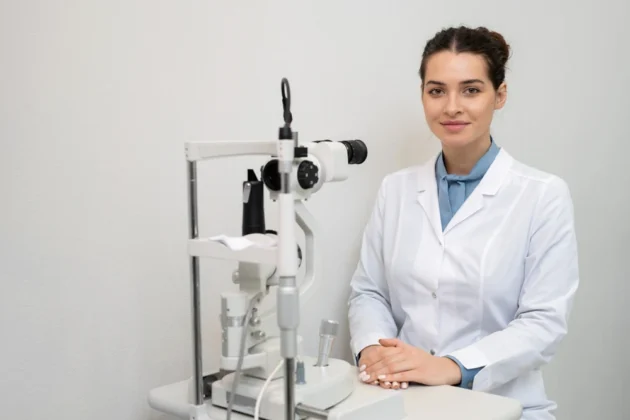When it’s time to get your eyes checked, making sure you see the right eye specialist for your needs is key. But figuring out the difference between an ophthalmologist and an optometrist can be tricky. Don’t worry, though! We’re here to make it super simple for you. In this blog, we’ll explain the big differences, like who does what, from checking your eyes to fixing them with surgery. Plus, we’ll help you decide who to visit for your eye problems with a clear breakdown of ophthalmologist vs optometrist. So, let’s dive in!
Contents
Ophthalmologist vs Optometrist: Distinguishing the Key Differences
 Understanding the distinction between ophthalmologists and optometrists is crucial for ensuring appropriate eye care. The primary difference lies in their scope of practice and the extent of their training.
Understanding the distinction between ophthalmologists and optometrists is crucial for ensuring appropriate eye care. The primary difference lies in their scope of practice and the extent of their training.
- Ophthalmologists are medical doctors (MDs) or doctors of osteopathic medicine (DOs) who specialize in eye and vision care. Their extensive training includes a medical degree followed by a residency in ophthalmology, which encompasses comprehensive training in all aspects of eye care, including diagnosis, treatment, and surgery for eye diseases and injuries. Ophthalmologists are equipped to offer a full range of eye care services, from prescribing glasses and contact lenses to performing intricate eye surgeries.
- Optometrists, holding a Doctor of Optometry (OD) degree, focus predominantly on primary vision care. Their training involves completing an optometry program, which prepares them to conduct eye exams, prescribe corrective lenses, and detect various eye abnormalities. Optometrists can manage and treat common eye conditions and, in some jurisdictions, prescribe medications for certain eye diseases. However, they do not perform eye surgery, with their role being primarily diagnostic and preventative in nature.
In essence, the fundamental difference between ophthalmologists and optometrists lies in their level of training and surgical capabilities. Ophthalmologists are medical or osteopathic doctors who can perform eye surgeries and treat complex eye diseases, while optometrists are healthcare professionals who provide primary eye care, focusing on vision correction and the detection of eye conditions.
Different Types of Eye Care Specialists
When it comes to eye care, the field is diverse, encompassing professionals with specialized training to address a wide range of visual and ocular health needs. Here’s a brief overview:
- Ophthalmologists: These are medical doctors (MDs) or doctors of osteopathy (DOs) who specialize in eye and vision care.
- Optometrists: Optometrists are healthcare professionals who provide primary vision care, ranging from sight testing and correction to the diagnosis, treatment, and management of vision changes. A
- Opticians: Opticians are technicians trained to design, verify, and fit eyeglass lenses and frames, contact lenses, and other devices to correct eyesight.
- Orthoptists: Specialists in diagnosing and treating disorders of eye movements and associated vision problems, orthoptists work closely with ophthalmologists to care for patients with conditions like strabismus (crossed eyes) and amblyopia (lazy eye). They provide non-surgical treatment options, such as eye exercises or the use of prisms.
- Ocularists: An ocularist specializes in the fabrication and fitting of ocular prostheses for people who have lost an eye or need cosmetic enhancement due to eye disease or injury.
Each type of eye care specialist plays a unique role in ensuring optimal eye health and vision care. Understanding these roles helps in making informed decisions when seeking eye care services.
Educational And Training: Ophthalmologist vs Optometrist
Aspect | Ophthalmologist | Optometrist |
Undergraduate Degree | Typically requires a Bachelor’s degree in a pre-medical field. | Requires a Bachelor’s degree, often in a science-related field. |
Professional Degree | Earn a Doctor of Medicine (MD) or Doctor of Osteopathy (DO) degree. | Earn a Doctor of Optometry (OD) degree. |
Medical School | 4 years of medical school, focusing on comprehensive medical education. | Not applicable. |
Optometry School | Not applicable. | 4 years, focusing on the eye and vision care, but not on general medicine or surgery. |
Residency | At least 3 years of residency in ophthalmology, concentrating on medical and surgical eye care. | Optional. Some optometrists complete a residency in a specialty area, but it’s not required. |
Fellowship | Optional. Many ophthalmologists undergo additional 1-2 years of fellowship training in sub-specialties like retina, glaucoma, or pediatric ophthalmology. | Optional. Some optometrists pursue further training in areas like contact lenses, low vision, or pediatric eye care, though less common. |
Licensing | Must pass a series of medical licensing exams, followed by board certification in ophthalmology. | Must pass the National Board of Examiners in Optometry exam, along with any state-specific requirements. |
Scope of Practice | Can diagnose and treat all eye diseases, perform eye surgery, prescribe medication, and fit eyeglasses and contact lenses. | Focuses on diagnosing and treating vision disorders, prescribing eyeglasses and contact lenses, and managing some common eye diseases. |
What Do They Do?
Specialization in Ophthalmology | Description | Specialization in Optometry | Description |
Retina Specialist | Focuses on the treatment of retinal diseases using surgical and laser procedures. | Low Vision Specialist | Concentrates on assisting patients with significant vision impairment, helping them optimize their remaining vision. |
Glaucoma Specialist | Specializes in the diagnosis and treatment (including surgery) of glaucoma and other types of eye pressure problems. | Sports Vision Specialist | Focuses on enhancing visual performance and protecting the eyes of athletes and active individuals. |
Pediatric Ophthalmologist | Deals with eye diseases, visual development, and vision care in children. | Occupational Vision Specialist | Aims to improve the visual comfort and efficiency of workers, addressing vision demands specific to different occupations. |
Cornea Specialist | Expert in diseases of the cornea, sclera, and eyelids, including surgical procedures like corneal transplants. | Contact Lens Specialist | Specializes in fitting contact lenses, including challenging cases like keratoconus or post-surgical corneas. |
Oculoplastic Surgeon | Specializes in plastic and reconstructive surgery of the eyelids, tear ducts, and orbit. | Geriatric Vision Specialist | Focuses on vision care tailored to the unique needs of aging patients, including management of age-related eye conditions. |
Understanding these specializations can help patients seek the most appropriate and effective care for their specific eye health and vision needs.
Choosing the Right Eye Care Professional for Your Needs
Selecting the right eye care professional is crucial for ensuring you receive the best possible care for your vision and eye health. Here are some practical tips to help you make an informed decision:
- Assess the nature of your eye condition.
- If you need a routine eye exam, a prescription for glasses or contact lenses, or management of common eye conditions, an optometrist might be the right choice. For more complex issues, diseases, or potential surgery, consult an ophthalmologist.
- Some eye conditions require regular monitoring and long-term management. Choose a professional who can provide continuity of care and is available for follow-up visits as needed.
- If you have specific eye care needs, consider a specialist who has the expertise to address your particular condition effectively.
By taking these factors into account, you can find an eye care professional who meets your needs, ensuring you receive the right care and treatment for your eyes. Remember, your vision is invaluable, and choosing the right provider is a key step in protecting and maintaining your eye health.
Conclusion
Your eyes do so much for you – from letting you see the beauty of the world to helping you navigate daily tasks. Isn’t it time you gave them the attention and care they deserve? Prioritizing your eye health is essential, and there’s no better time to start than now. Whether you’re experiencing vision changes, have specific eye concerns, or it’s just been a while since your last check-up, we’re here to help.
Don’t wait for minor issues to become major problems. Book your free appointment today at the Best Eye Hospital in India and give your eyes the expert care they need. If you have questions or need further assistance, feel free to call us at +91 9711116605. Your vision is priceless – let’s protect and enhance it together.



